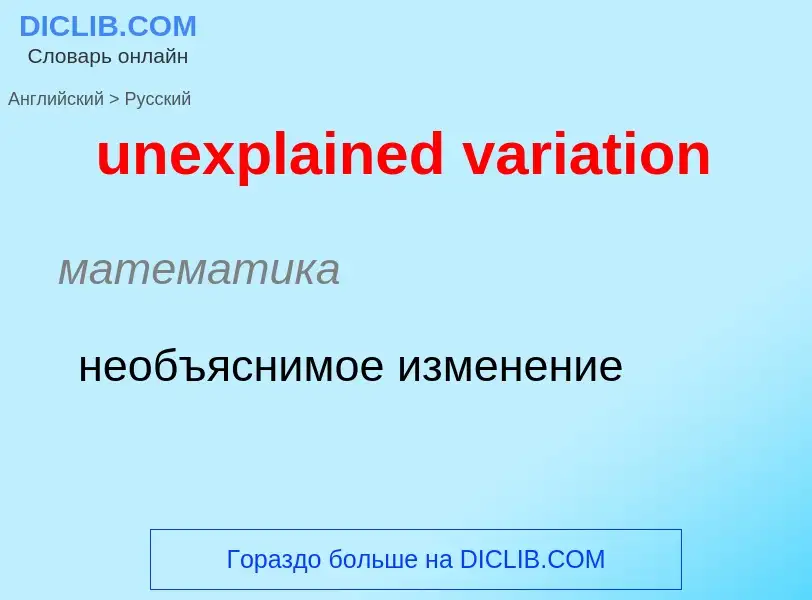Translation and analysis of words by ChatGPT artificial intelligence
On this page you can get a detailed analysis of a word or phrase, produced by the best artificial intelligence technology to date:
- how the word is used
- frequency of use
- it is used more often in oral or written speech
- word translation options
- usage examples (several phrases with translation)
- etymology
unexplained variation - translation to russian
математика
необъяснимое изменение
математика
объяснимое изменение
Definition
Wikipedia
Medically unexplained physical symptoms (MUPS or MUS) are symptoms for which a treating physician or other healthcare providers have found no medical cause, or whose cause remains contested. In its strictest sense, the term simply means that the cause for the symptoms is unknown or disputed—there is no scientific consensus. Not all medically unexplained symptoms are influenced by identifiable psychological factors. However, in practice, most physicians and authors who use the term consider that the symptoms most likely arise from psychological causes. Typically, the possibility that MUPS are caused by prescription drugs or other drugs is ignored. It is estimated that between 15% and 30% of all primary care consultations are for medically unexplained symptoms. A large Canadian community survey revealed that the most common medically unexplained symptoms are musculoskeletal pain, ear, nose, and throat symptoms, abdominal pain and gastrointestinal symptoms, fatigue, and dizziness. The term MUPS can also be used to refer to syndromes whose etiology remains contested, including chronic fatigue syndrome, fibromyalgia, multiple chemical sensitivity and Gulf War illness.
The term medically unexplained symptoms is in some cases treated as synonymous to older terms such as psychosomatic symptoms, conversion disorders, somatic symptoms, somatisations or somatoform disorders; as well as contemporary terms such as functional disorders, bodily distress, and persistent physical symptoms. The plethora of terms reflects imprecision and uncertainty in their definition, controversy, and care taken to avoid stigmatising affected people. Risk factors for medically unexplained symptoms are complex and include both psychological and organic features, and such symptoms are often accompanied by other somatic symptoms attributable to organic disease. As such it is recognised that the boundary defining symptoms as medically unexplained is increasingly becoming blurred.
Women are significantly more likely than men to be diagnosed with Medically Unexplained Symptoms. Childhood adversity and/or abuse, and the death or serious illness of a close family member are significant risk factors.
Many patients presenting with medically unexplained symptoms also meet the diagnostic criteria for anxiety and/or depression. The likelihood of meeting such criteria increases with the number of unexplained symptoms reported. However, anxiety and depression are also very common in individuals with medically explained illnesses, and again, the likelihood of a person receiving one of these diagnoses increases with the number of symptoms reported.
Physical symptoms have been associated with adverse psychosocial and functional outcome across different cultures, irrespective of etiology (either explained or unexplained).


